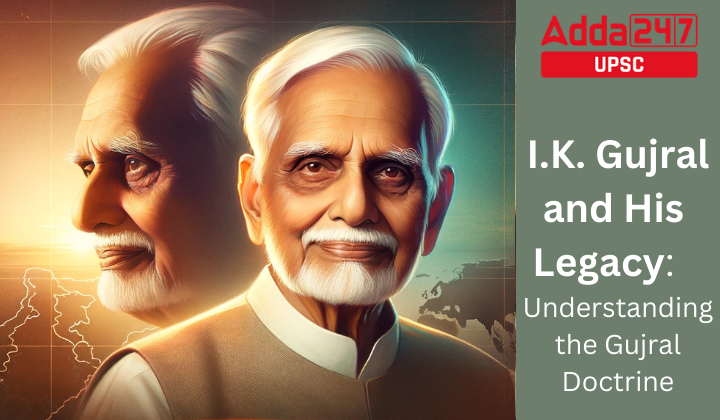Table of Contents
Inder Kumar Gujral, the 12th Prime Minister of India, though in office for less than a year, left a lasting imprint on the canvas of Indian foreign policy. The creation of the “Gujral Doctrine,” which marked his tenure, redefined India’s policy toward its neighbors. This doctrine, unique in its vision and execution, continues to resonate in the corridors of South Asian diplomacy.
The Genesis of the Gujral Doctrine
Early Life and Political Ascendancy
IK Gujral’s journey in politics began in the tumultuous era of India’s struggle for independence. His deep-rooted convictions in democratic values and his exposure to the harsh realities of partition shaped his worldview. Rising through the ranks of Indian politics, Gujral’s diplomatic acumen was honed during his stints as India’s External Affairs Minister.
Gujral Doctrine: A Paradigm Shift in Foreign Policy
Background and Principles
The Gujral Doctrine, formulated during IK Gujral’s time as the External Affairs Minister and later as Prime Minister, marked a significant shift in India’s approach towards its neighbors. It was based on five fundamental principles:
- Non-reciprocal Benevolence: India, being the larger country, would extend unreciprocated concessions and cooperation to its neighbors.
- Respect for Sovereignty: No South Asian country would allow its territory to be used against another.
- Non-interference: A pledge of non-interference in the internal affairs of neighboring countries
- Respect for Territorial Integrity: Upholding each other’s territorial integrity and sovereignty
- Peaceful Settlement of Disputes: Resolving disputes through peaceful bilateral negotiations
Significance
This doctrine was a departure from transactional and often reciprocity-based foreign policy. It recognized India’s unique position in South Asia and aimed to foster trust and cooperation. The doctrine was especially relevant in the context of strained relationships with neighbors in the preceding years.
Implementation and Successes
Strengthening Regional Cooperation
Under the Gujral Doctrine, several significant agreements were reached, strengthening regional cooperation. The most notable among these was the 30-year treaty with Bangladesh for water sharing, a demonstration of India’s willingness to prioritize regional stability over immediate reciprocal benefits.
Continuing Legacy
What stands out about the Gujral Doctrine is its acceptance by successive governments in India, transcending political ideologies. This underscores its pragmatic and forward-looking vision for addressing regional challenges.
Ideological Underpinnings
The Gujral Doctrine emerged from a comprehensive understanding of the geo-political dynamics of South Asia. It was predicated on the notion that, as the largest nation in the region, India must take a magnanimous and non-reciprocal approach in its dealings with neighbors.
Core Tenets of the Gujral Doctrine
A Shift from Reciprocity
At its core, the Gujral Doctrine advocated for a relationship with neighboring countries that wasn’t based on reciprocity but on generosity and trust. Gujral believed that India, by virtue of its size and economic status, should extend support to its neighbors without expecting immediate returns.
Non-Interference and Respect for Sovereignty
Another pillar of the doctrine was the principle of non-interference in the internal affairs of neighboring countries. Gujral underscored the importance of respecting the sovereignty and territorial integrity of all nations in the region.
Peaceful Resolution of Disputes
The doctrine emphasized the settlement of regional disputes through bilateral negotiations, advocating for a peaceful and cooperative regional environment.
Implementation and Impact
Strengthening Regional Ties
The Gujral Doctrine was instrumental in mending and strengthening India’s relations with its neighbors. One of the most significant achievements was the 30-year water-sharing treaty with Bangladesh, which showcased India’s commitment to the doctrine’s principles.
Gujral and Pakistan: A Complex Engagement
Despite not explicitly including Pakistan in the named countries of the doctrine, Gujral maintained a policy of engagement. He eased travel restrictions for Pakistani citizens and sought to keep diplomatic channels open, as epitomized by his famous conversation with Nawaz Sharif.
Criticisms and Challenges
The Gujral Doctrine, however, faced criticism for being overly accommodating, particularly towards Pakistan. The rise in cross-border terrorism and the Kargil conflict later highlighted the limitations of a policy based on unilateral goodwill.
Sustainability and institutional support
The doctrine’s longevity and effectiveness were also questioned, given its perceived dependence on the personal charisma and conviction of Gujral rather than institutional backing within the Indian foreign policy establishment.
The Man Behind the Doctrine
A Leader of Conviction
Gujral’s personal attributes of politeness, firmness, and a deep commitment to democratic values were reflected in his foreign policy vision. His experiences, particularly during the partition and the emergency period in India, profoundly influenced his approach to politics and diplomacy.
A Diplomat’s Perspective
As a seasoned diplomat, Gujral brought a unique perspective to the Prime Minister’s office. His understanding of international affairs, combined with his commitment to peaceful coexistence, shaped the contours of the doctrine.
Legacy and Relevance
Enduring Influence
The Gujral Doctrine, despite its critics, left an enduring impact on India’s foreign policy. The principles of non-reciprocity, peaceful coexistence, and respect for sovereignty continue to be relevant in the complex geopolitical landscape of South Asia.
Beyond Gujral’s Tenure
Successive Indian governments have, to varying degrees, upheld the spirit of the Gujral Doctrine in their foreign policy, especially in fostering regional cooperation and dialogue.
Conclusion: A Visionary’s Contribution to Diplomacy
Inder Kumar Gujral’s stint as Prime Minister might have been brief, but his legacy in the realm of foreign policy is significant. The Gujral Doctrine stands as a testament to his vision of a peaceful and cooperative South Asia, transcending traditional paradigms of power politics. As the region continues to navigate the challenges of the 21st century, the principles espoused by Gujral remain a guiding light for diplomatic engagement and regional harmony.



 TSPSC Group 1 Question Paper 2024, Downl...
TSPSC Group 1 Question Paper 2024, Downl...
 TSPSC Group 1 Answer key 2024 Out, Downl...
TSPSC Group 1 Answer key 2024 Out, Downl...
 UPSC Prelims 2024 Question Paper, Downlo...
UPSC Prelims 2024 Question Paper, Downlo...





